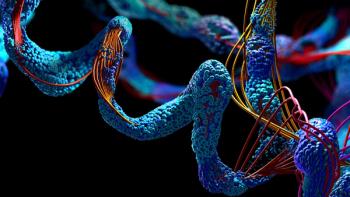
Research Shows Protein's Ability to Prevent HIV Cell Replication
Researchers show TIM-1 proteins and lipids play role in blocking HIV-1 cells and Ebola from replicating.
A family of proteins that promotes virus entry into cells also has the ability to block the release of HIV and other viruses, University of Missouri researchers have found. The study was recently published in the Proceedings of the National Academy of Sciences.
When HIV-1 infects a cell, it replicates and spreads to other cells. T cell immunoglobulin and mucin domain, or TIM-1, has previously been shown to promote entry of some highly pathogenic viruses into host cells. The MU researchers have found that the same protein possesses a unique ability to block the release of HIV-1 and Ebola virus. The TIM proteins prevent viral particles from being released from the infected cell, which may in turn slow the production of the viruses.
The researchers found that as the viral particles attempt to bud from an infected cell, the TIM-family proteins located on the surface of the cell can attach to lipids, known as phosphatidylserine (PS), on the surface of the viral particle. When the TIM-family proteins come in contact with PS, the viral particle becomes attached to the host cell, keeping the particle from being released from the cell. Because TIM-family proteins and PS are present on the surface of the cell and the viral particle, the viral particles get stuck to one another, forming a network of viral particles that accumulate on the surface of the host cell, rather than being released to infect other cells.
By using molecular, biochemical and electron microscopic approaches, the researchers observed the TIM and PS interactions in human cells. Next, the researchers plan to study the biological significance of TIM-family proteins in animals and patients and to determine the fate of the infected cell once it accumulates a buildup of viral particles.
Source:
Newsletter
Stay at the forefront of biopharmaceutical innovation—subscribe to BioPharm International for expert insights on drug development, manufacturing, compliance, and more.




